DUSHANBE WATER PROCESS. Aziz Nazar: “Thanks to H.E. Emomali Rahmon, Tajikistan Is Recognized as the Leading Country in World Water Processes”
Read also
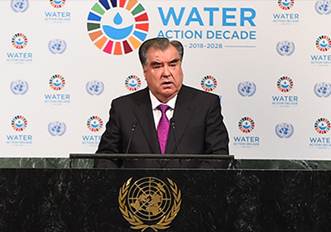
DUSHANBE, 17.12.2022 (NIAT Khovar) – The United Nations 2023 Water Conference should become a historic event, not only in terms of the time dimension, but also in terms of its impact on the Global Water Processes and adoption of concrete actions. The conference will include 6 plenary sessions, 5 interactive dialogues, as well as cultural events. The five topics of the interactive dialogues were approved by the President of the UN General Assembly as part of the preparatory meeting held on October 25, 2022 in New York. Aziz NAZAR, Head of External Economic Cooperation Department of the Ministry of Foreign Affairs, told Khovar correspondent Laylo TOIRI about the goals and objectives of the plenary sessions and interactive dialogues of the upcoming conference.
— What is the concept of Dushanbe Water Process»?
— It is globally recognized that for over past 20 years Tajikistan has been one of the active members of the international community and a key country in promoting water issues in the Sustainable Development Agenda. During this period, global initiatives of the President of Tajikistan H.E. Emomali Rahmon, such as the “International Year of Clean Water – 2003”, the “International Decade of Action «Water for Life», 2005-2015”, and the “International Year of Water Cooperation — 2013” which were of not only regional but global importance were implemented.
As we know, at the proposal of Tajikistan, the UN General Assembly adopted resolution to declare 2018-2028 the International Decade for Action «Water for Sustainable Development». The main goal of the decade is to support sustainable development and integrated water resources management, organize coordinated work of the international community to achieve goals and objectives in the field of water resources.
Dushanbe Water Process is the organization and holding of conferences and other high-level thematic events on the water agenda within the International Decade for Action «Water for Sustainable Development, 2018-2028». As a part of this process, the First High-Level International Conference on the Implementation of the Goals of the International Decade for Action “Water for Sustainable Development, 2018-2028” (First Dushanbe Water Conference) held on June 20-21, 2018 in Dushanbe. The conference resulted in the elaboration of specific recommendations to the High-Level Political Forum on Sustainable Development, which took place in 2018 and adopted them for in-depth review in the framework of the implementation of SDG 6. The final declaration of the First Dushanbe Water Conference confirmed that the next conference should focus on the theme “Catalyzing Water Action and Partnership at the Local, National, Regional and Global Levels” to achieve the goals of the decade and the water-related goals and targets of the SDGs.
Also, within the framework of the «Dushanbe Water Process», from June 6 to 9, 2022, the second High-level International Conference on “Catalyzing Water Action and Partnership at the Local, National, Regional and Global Levels” was held, which became a good platform for highlighting and consolidating the necessary information on water, served as a central link in preparation for the United Nations Conference on the Mid-term Comprehensive Review of the Implementation of the International Decade of Action «Water for Sustainable Development, 2018-2028», which will be held from March 22 to 24, 2023 in New York under the co-chairmanship of the Republic of Tajikistan and the Kingdom of the Netherlands. It will be the first UN conference on water resources in the last 46 years. The first United Nations Water Conference held in 1977 in Mar del Plata (Argentina). Within activities of the Dushanbe Water Process, held every two years, a favorable and timely environment for reviewing the implementation of the decade and developing interaction with other relevant processes, as well as expanding partnerships and strengthening cooperation at the local, regional and international levels will be provided.
— What results have been achieved by Tajikistan’s global initiatives in the field of water resources to date?
— Tajikistan has already achieved its goals within the framework of these initiatives, i.e. the attention of international community has been drawn to the water problem and the negative consequences of the shortage of drinking water, certain actions are being taken to solve this problem. It is important to note that cooperation is being strengthened and relations in this vital area are being regulated. The water theme is freed from the framework of its classical and outdated understanding. The countries of the world are directing their efforts to the proper use of water resources, striving to learn from each other’s experience in resolving controversial issues, including the management of water resources of trans-boundary rivers.
Indeed, it is a source of pride that at present the Republic of Tajikistan is recognized in the world as a country actively involved in solving global issues and regulating political processes in the region. Our Government has strengthened its position on the water agenda, promoting a logical policy and constructive proposals, and in the future will continue to make its undeniable contribution to the global achievement of the SDGs.
— What is the purpose of the UN Water Conference, what themes does it cover?
— The goal of the UN 2023 Water Conference is to take joint actions to achieve internationally approved plans, objectives and commitments on water resources. The Republic of Tajikistan and the Kingdom of the Netherlands as co-hosts of the conference, UNDESA and UN-Water as the Secretariat strive to make the Water Conference a turning point that can unite the whole world to achieve water goals.
The Co-Hosts of the United Nations 2023 Water Conference, Tajikistan and the Netherlands, are making efforts to make it historic, not only in terms of time frame, but also in terms of qualitative outcomes.
On October 25, 2022, a high-level meeting of the President of the 77th Session of the UN General Assembly (UNGA) on preparations for the UN Conference on the Midterm Comprehensive Review of the implementation of the goals of the International Decade for Action «Water for Sustainable Development, 2018-2028» held in New York. The meeting was convened by the President of the UNGA in accordance with the Paragraph 16 of GA Resolution 75/212 in order to finalize the themes of the interactive dialogues and other outstanding organizational matters of the UN 2023 Water Conference.
It should be noted that the Founder of Peace and National Unity, the Leader of the Nation, President of the Republic of Tajikistan, His Excellency Emomali Rahmon, took part in the opening ceremony of the meeting, where delivered a speech through a video message. The event provided a good opportunity for representatives of the participating countries and other interested parties to sit down at the discussion table at the stages of the preparatory process for the UN 2023 Water Conference. Following the meeting, the Chairman of the UN General Assembly, H.E. Csaba Kőrösi, announced the final versions of the themes of the interactive dialogues of the UN 2023 Water Conference.
The first theme of the conference is «Water for Health: Access to Safe Drinking Water, Hygiene and Sanitation». This topic includes the goals and objectives of sustainable development, including integrated water resources management, eradicating hunger, ensuring food security, promoting sustainable agricultural development, ensuring gender equality, empowering women and girls, promoting inclusive and sustainable development, full employment, and decent working conditions. The second theme is «Water for Development: Valuing Water, the Water-Energy-Food Nexus and Sustainable Economic and Urban Development», it will address issues related to the creation of sustainable infrastructure, promotion of industrialization and comprehensive innovation, ensuring openness, security, environmental stability of cities and settlements, ensuring the transition to sustainable forms of consumption, production, etc.
The third theme of the interactive dialogues — «Water for Climate, Resilience and the Environment: Source to Sea, Biodiversity, Climate, Resilience and Disaster Risk Reduction (DRR)» in general refers to the collective actions of countries to combat the effects of climate change, reduce human mortality as a result of natural disasters and access to sustainable energy.
The objectives of the fourth theme of the interactive dialogues «Water for Cooperation: Trans-boundary and International Water Cooperation, Cross-sectoral Cooperation and Water Across the 2030 Agenda» are to maintain and strengthen the participation of local communities in improving water resources management and sanitation, promoting peaceful and inclusive societies for sustainable development, ensuring access to justice for all, creating sustainable institutions and global partnership for sustainable development.
And finally, the fifth theme is «Water Action Decade: Accelerating the Implementation of the Objectives of the Decade, Including through the Secretary-General’s Action Plan», five themes correspond to the five «accelerators» of the global framework for accelerating SDG 6 (Financing, Data and Information, Capacity Development, Innovation, Governance) and the three principles of the UN 2023 Water Conference (Inclusive, Action-Oriented and Cross-Sectoral).
— Why exactly Tajikistan and the Netherlands will be co-hosts of the UN 2023 Water Conference next year?
— This is the UN procedure, such conferences are co-hosted by two countries, one of these countries should be developed, and the other should be developing. Taking into account the efforts of the President of the Republic of Tajikistan, H.E. Emomali Rahmon, our country is recognized as a leading country in the world water processes, and for Tajikistan being a Co-Host of the conference is quite logical. For the Kingdom of the Netherlands to be another Co-Host of the conference is logical too, since this country has also been actively working on the water issue. The King Willem-Alexander of the Netherlands was the Chair of the UN Secretary-General’s Advisory Board on Water and Sanitation (UNSGAB) for several years before he ascended to the throne, and the Netherlands also provides great assistance to various countries in solving water-related issues. On the other hand, this country, despite the fact that it is developed, with new technologies and good experience, still faces many problems. One of the most serious problems is sea level rise, which greatly affects coastal settlements. Therefore, the Netherlands has built very large barriers to protect its territory and population.
Furthermore, if we look at access to clean drinking water today, regardless of developed or developing, all countries face these problems. Because the global population is increasing, and the supply of drinking water is decreasing. Therefore, developed countries have also significantly intensified their efforts towards the efficient use of water resources.
I suppose another point may be to show the international community how two geographically, economically and culturally different countries can cooperate for the sake of water. This is a vivid evidence of the role of water in uniting people and different countries, the global nature of the problem. We called this approach «From South to Sea», which means the unification of different continents for the sake of water.
— What is the current level of preparation for the UN Conference?
— The Government of the Kingdom of the Netherlands is closely cooperating with the Government of the Republic of Tajikistan on water issues and the organization of the UN 2023 Water Conference.
Both countries used a variety of platforms, including the Bonn Water Dialogue, the 26th Conference of the Parties to the UN Framework Convention on Climate Change (COP26), the World Water Week, the Group of Friends of Water, the 9th World Water Forum, the 4th Asia-Pacific Water Summit, the Second Dushanbe Water Conference, the UN Ocean Conference, the 27th Conference of the Parties to the UN Framework Convention on Climate Change (COP27), etc., to inform the world community about the UN 2023 Water Conference, its goals and objectives, importance and possible outcomes.
For example, within the framework of COP27, speeches by the Leader of the Nation, the President of Tajikistan and the Prime Minister of the Netherlands with special attention to the 2023 Conference, a special water pavilion, a special session, a media briefing, interviews and speeches at the final meeting attracted great attention to the historic Water Conference in 2023.
We have already done a lot to be prepared for the conference. Together with the working group, we have developed documents that formulated our approaches, goals and objectives, both in the preparatory process and during the conference itself. All our work should be aimed at actions and stimulation of countries, international organizations and financial institutions for certain actions that would give results, as well as an intersectoral approach, that is, we should not consider water issues exclusively from the point of view of the water sector. Water is the source of our life, so we must look at the water issue, water goals and actions from the point of view of other processes. That is, we need to go beyond the water sector and involve agriculture, energy, industry, climate in this process, all sectors should be involved in this process.
The most important outcome of the Dushanbe Conference from the point of view of the 2023 Conference is the launch of the Water Action Agenda – a transformative voluntary mechanism of the UN 2023 Water Conference that will unite such commitments and lay the foundation for new actions, accelerate existing efforts and strengthen cooperation and partnerships to achieve SDG 6 and other water-related goals.
As you might be aware, recently the Ministry of Foreign Affairs held a briefing to highlight the process of preparation for the UN 2023 Water Conference with the participation of heads of diplomatic missions in Dushanbe, international financial organizations and institutions in cooperation with the Executive Committee of the International Fund for Saving the Aral Sea. The purpose of the briefing was to inform representatives of the diplomatic corps and international organizations accredited in Tajikistan, as well as civil society and the media about the importance of the conference and the achievements of Tajik water diplomacy. We hope that the Co-Host of Tajikistan will make a great contribution to solving water problems at the national, regional and global levels.











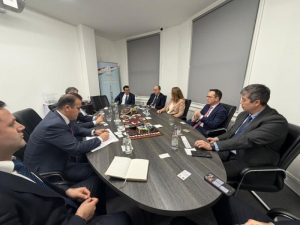 Tajik Delegation Holds Investment Talks With International Financial Institutions in London
Tajik Delegation Holds Investment Talks With International Financial Institutions in London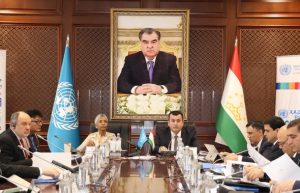 Tajikistan, United Nations Discuss 2027-2030 Sustainable Development Agenda
Tajikistan, United Nations Discuss 2027-2030 Sustainable Development Agenda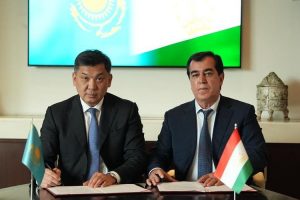 Tajik and Kazakh Railway Leaders Agree on Development of Transport Corridors
Tajik and Kazakh Railway Leaders Agree on Development of Transport Corridors Financing Issues Related to the Continued Construction of the Rogun HPP Discussed in Dushanbe
Financing Issues Related to the Continued Construction of the Rogun HPP Discussed in Dushanbe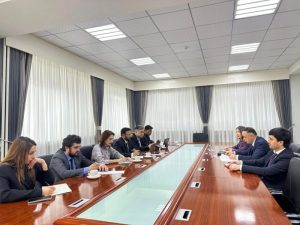 Implementation of Investment Projects and Attraction of Asian Development Bank Funds to Tajikistan’s Economy Discussed in Dushanbe
Implementation of Investment Projects and Attraction of Asian Development Bank Funds to Tajikistan’s Economy Discussed in Dushanbe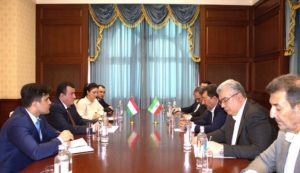 Tajikistan — Iran Expand Economic and Trade Cooperation
Tajikistan — Iran Expand Economic and Trade Cooperation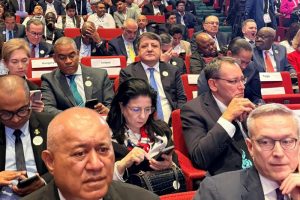 Tajik Delegation Participates in the Global India AI Impact Summit 2026
Tajik Delegation Participates in the Global India AI Impact Summit 2026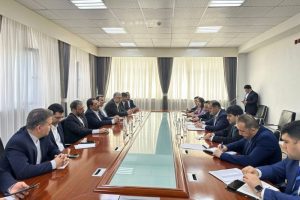 Tajikistan and Iran Discuss Direct Investment Opportunities in Tajik Economy
Tajikistan and Iran Discuss Direct Investment Opportunities in Tajik Economy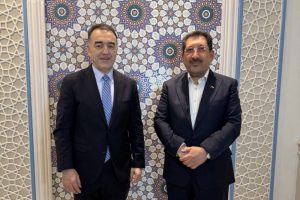 Tajikistan and Iran Discuss Prospects for Economic and Trade Cooperation
Tajikistan and Iran Discuss Prospects for Economic and Trade Cooperation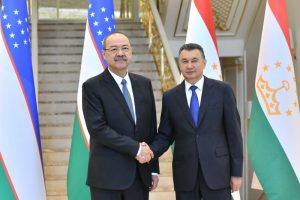 Tajikistan–Uzbekistan Commission Meeting Focuses on Expanding Economic Cooperation
Tajikistan–Uzbekistan Commission Meeting Focuses on Expanding Economic Cooperation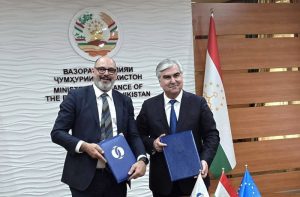 Tajikistan, EBRD sign loan and grant agreements for energy loss reduction project
Tajikistan, EBRD sign loan and grant agreements for energy loss reduction project Tajikistan to Welcome Global Investors at “Dushanbe Invest-2025” Forum
Tajikistan to Welcome Global Investors at “Dushanbe Invest-2025” Forum














